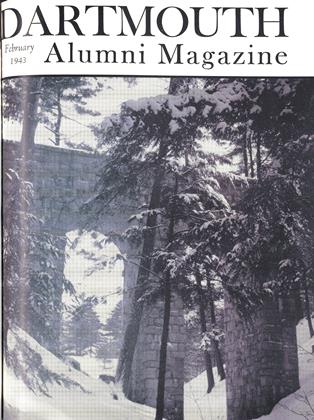by Gordon HallGerould 'pp. Little, Brown, and Cos., 1P42,526 pp. $3.00.
AN ALTOGETHER SATISFACTORY history of English and American fiction is the hardest of all histories to write. Social history after a few decades falls into a broadly acceptable scheme, but great works of art stubbornly resist the imposition of charted relationship. This is most of all true of novels, and in the novel most of all true of the fiction of England and America, which has been the product of discrete genius rather than of such intellectual and cumulative doctrine as that of the French writers. To avoid the box car method of the usual literary history, Prof. Gerould has commendably set out to uncover "the patterns of thought and design to which stories have been accommodated from century to century." Nevertheless, the inherent difficulty works to defeat his purpose. Either the writers follow one another with no significant relationship or he has to lump Hawthorne, Melville, and the Brontes together under such a vague caption as "Interpreters."
Prof. Gerould's temperamental sympathies and his attention are with the older writers. Walter Scott is given long and capable discus sion because he le£t to posterity "a body of work so rich in content and so rare in quality that its virtues have become clearer than ever," while James Joyce is given brief attention as one whose experiments "led only to monstrous failure."
This study says little which is fresh and scants aesthetic criticism for retelling of plot, for the book is directed primarily at the college student, who will find it an ever-present help in time of trouble. Whatever it lacks in energy and daring it makes up in solidity, scope, and accepted academic judgment stated with clarity and knowledge. It is a professor's book, but since, with few exceptions, the novels of the 18th and 19th centuries are read only because professors ask questions about them, a professor's opinions are useful.
 View Full Issue
View Full Issue
More From This Issue
-
 Article
ArticleSulzberger Addresses 1943
February 1943 -
 Article
Article'Round the Girdled Earth
February 1943 By Herbert F. West '22. -
 Article
ArticleColleges Will be Used for Military Training
February 1943 By LLOYD K. NEIDLINGER '23 -
 Article
ArticleGovernment War Work
February 1943 -
 Class Notes
Class Notes1939
February 1943 By RICHARD S. JACKSON -
 Class Notes
Class Notes1929
February 1943 By F. WILLIAM ANDRES
Allan Macdonald.
Books
-
 Books
BooksALUMNI PUBLICATIONS
June, 1922 -
 Books
BooksAlumni Articles
JUNE 1973 -
 Books
BooksJOSHUA R. GIDDINGS AND THE TACTICS OF RADICAL POLITICS.
OCTOBER 1970 By Charles M. Wiltse -
 Books
BooksTHE FRENCH REVOLUTION
February 1933 By Frank Maloy Anderson -
 Books
BooksKENTUCKY PRIDE.
November 1956 By HERBERT W. HILL -
 Books
BooksTALL TREES, TOUGH MEN.
MAY 1967 By ROBERT S. MONAHAN '29



